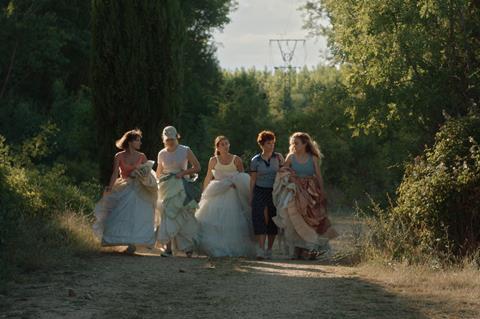
Spanish director Itsaso Arana previously attended Karlovy Vary after co-writing and starring in the 2019 film August Virgin directed by Jonás Trueba.
Now she returns with her debut feature The Girls Are Alright (Las Chicas Están Bien) which has its world premiere on July 1 as part of Karlovy Vary’s Crystal Globe Competition. Asana also produces and stars in the film.
The film, which takes in elements of both fiction and documentary, is about a group of women who head off to a house in the country to spend a week rehearsing a play. There they talk about love, life and death while they perform the play and also acknowledge the existence of the very film they are appearing in.
The Spanish film is produced by Los Ilusos Films. Sales are handled by Tenerife-based Bendita Film Sales.

You’ve said of the film “Don’t be fooled by its apparent summery lightness: the film is born from the heart-breaking experience of watching a body die”. Can you expand upon that?
I think that the main challenge of this film was to find the lightness that can come from a very deep experience. When my dad died all the women in my family were around his bed, and in that moment I had a very profound intuition: I felt the duty to share this transformative experience with others. I learnt something about the very deep meaning of being alive, and my commitment to living my own life grew somehow. Now, just a few days before the world premiere of our little summer tale, I can say that the bravery to make this film came from that sacred source.
Everyone in the film is a friend and a colleague. How did they react when you first mentioned the idea of creating the film?
I cannot imagine this experience without this very talented group of actresses. At the beginning, I thought about the youngest ones, Helena [Ezquerro] and Itziar [Escolar], because of their life stories. Later, I realised that the presence of [experienced theatre and cinema actresses] Irene [Manero] and Barbara [Lennie] would bring some interesting knowledge about our shared passion. I thought that this companionship between women and actresses was the main key to the film.
The film is very resistant to categorisation. It’s a drama, it’s a documentary, it’s a comedy. It’s everything and more. How did you approach it as a director?
The secret of leadership is managing between guiding and letting be. I feel so lucky about my role in the film, I think that it helped in this balance. I’m proud about finding the sweet spot between my role as an actress (and the writer of the play too) and the camera and the other actresses. Sometimes the actresses didn’t know if I was directing the film or the play inside the film, and this erasure of limits was so interesting to me.
You wrote a very personal script. How did that translate to what we see on screen?
Everything was totally written beforehand, but the script was so personal that we could change as much as we wanted, because we were always around our own truth. I conducted some interviews with the actresses on the subjects of the film and then I wrote the script specifically for each one of them. I know them well, they’re my friends, my colleagues, I admire their work. At the same time, I asked of them a lot of flexibility, variations and improvisations.
Can you tell us a little more about the location. Was the house and village somewhere familiar to you?
I didn’t completely decide that I was able to shoot the film until I found this magical place. At the same moment that I was at the front door of that house, where we start the film in the very first sequence, I deeply felt that the film was going to exist, finally. Mercedes, the owner, is such a fascinating woman that I decided to include her in the film, so she’s there both as an actress and as the owner herself. When I first met her I said to her: “you’ve been working in the art department of our film your whole life it and I’ve written a film for this house without even knowing it…”
Coming from an acting background, how did you fare with the more business side of putting a film together. How was it funding the film?
I formed my own theatre company when I was 19 so…. I really know how difficult it is to manifest any little idea into reality. When I first met Los Ilusos Films and their work philosophy I immediately felt that we were going to connect and work great together.
The Girls are Alright wouldn’t exist at all without them. They really committed to the project and the script from the beginning. It was a small budget but it was enough for the kind of film we wanted to do. We made this film in 15 days. We had the house, we had the girls, we had a small crew, so we took the risk. I’m deeply grateful for that. We could shoot very quickly, when my creative impulse was totally alive.

























No comments yet